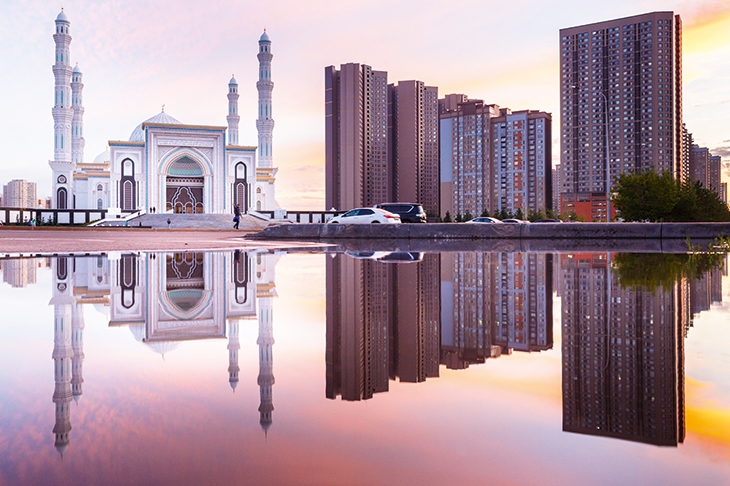Kazakhstan, say signs by the side of the road in this vast Central Asian country, is ‘a land of unity and accord’. Few outside pay a great deal of attention to a state that is almost as large as Europe, and home to eye-popping natural resources, chiefly — but not only — oil. One who does is Joanna Lillis, who used to work in Russia and then for the BBC Monitoring Service in neighbouring Uzbekistan, and knows the region as well as anyone.
Her book, Dark Shadows, is astute, refreshing and revelatory; it is also surprisingly tender, showing not only her affection but her care in trying to make sense of a country that needs to be understood warts and all. She introduces a cast of characters one could not make up, from an Old Believer living in the north of the country to a militant atheist, whose grim convictions are not entirely appealing. We meet those suffering from the effects of Soviet-era nuclear experiments and children infected with HIV in a blood scandal, whose dignity in the face of injustice and tragedy is particularly moving. We come across Mukhtar Ablyazov, a tycoon who plundered billions before going on the run — one step better than his former business partner, whose death in a wolf-hunting accident was described by American diplomats in cables released by WikiLeaks as ‘almost incomprehensible’.Dark shadows indeed.
The star of the show, however, is the country’s leader, Nursultan Nazarbayev — a man who has been alive long enough to remember every ruler of the Soviet Union and Russia apart from Lenin. Nazarbayev is an all-conquering figure in Kazakhstan, the man whom even his opponents vote for in presidential elections (along with more than 95 per cent of the rest of the population), the sort known as Yelbasy — or ‘Father of the Nation’. He is a leader, according to Lillis, who ‘makes his people’s dreams come true’.‘I consider Nazarbayev to be my father,’ one young man tells her.
Nazarbayev is a certainly a man with the common touch, who has been saying the right things at the right time since the 1980s, when Gorbachev’s reforms brought opportunity and challenge in equal measure. He presents himself as a consummate man of the people, flying to Zhanaozen in 2011 after security forces opened fire and killed protesting miners to assure them that he knew of their difficulties and promising to resolve them.
He is quixotic, too, wondering from time to time if he should step down and let someone else take over a state he has run since the collapse of the Soviet Union — like changing the scenery in the theatre, he muses. The difficulty, as one astute commentator tells Lillis, is not so much choosing a successor but finding a way to assure the handover of power. Who takes control, when and how is the multi-billion-dollar question.
That does not excuse, but might at least explain, why the authorities go to ‘often extreme, sometimes farcical’ lengths to stamp out dissent, crack down on any opposition and give newspapers little option but to change their names frequently in their efforts to avoid being banned. Lillis does not shy away from describing the faults and problems; the fact that she looks for explanations and provides context is enormously helpful to those wanting to understand why Kazakhstan is the way it is.
It is hard to overstate the suffering that the Kazakhs experienced, first under Russian and then Soviet rule. No other state subjected by Moscow has undergone such ‘demographic and linguistic upheaval’ as Kazakhstan — a country where a full third of the population still do not speak Kazakh. The Kazakhs experienced grotesque discrimination, as so many nomadic peoples have done in the past. But the ‘Great Zhut’ (or tragedy) was almost unimaginable in scale and intensity. Millions died in a famine — perhaps as much as a third of the population — while tens of thousands more were murdered or interned in the gulag.
Perhaps not surprisingly, Putin’s comment that the Kazakhs ‘never had statehood’ send shivers down the spine — though Lillis notes that most of the people she talks to about Ukraine have little sympathy for others who have found themselves in the sights of an expansionist Russia.
This underpins the need to shape a national narrative, the most obvious example of which is the sparkling new city of Astana, built ‘at breathtaking pace’, as a symbol of the ‘reinvention of a nation’. The official reason for the move of the capital was that Almaty, in the south, offered little room to expand; in fact, it was about ensuring that the country stayed intact by having its government in the centre.
Europe is involved in this story too, if usually unwittingly. The fate of one Kazakh oligarch and his family led to votes of no confidence in the Italian interior minister; saw France’s prime minister overruled by the Conseil d’Etat; and involved more than 200 court hearings, and 500 (well-paid) lawyers in the UK.
It is not easy to look beneath the surface and make sense of a country of such contrasts and complexities, especially one that is in transition. You don’t need a book about Kazakhstan to realise that the world is changing; but reading Dark Shadows is a great place to start for anyone wanting to see how and why Central Asia matters in the 21st century.






Comments